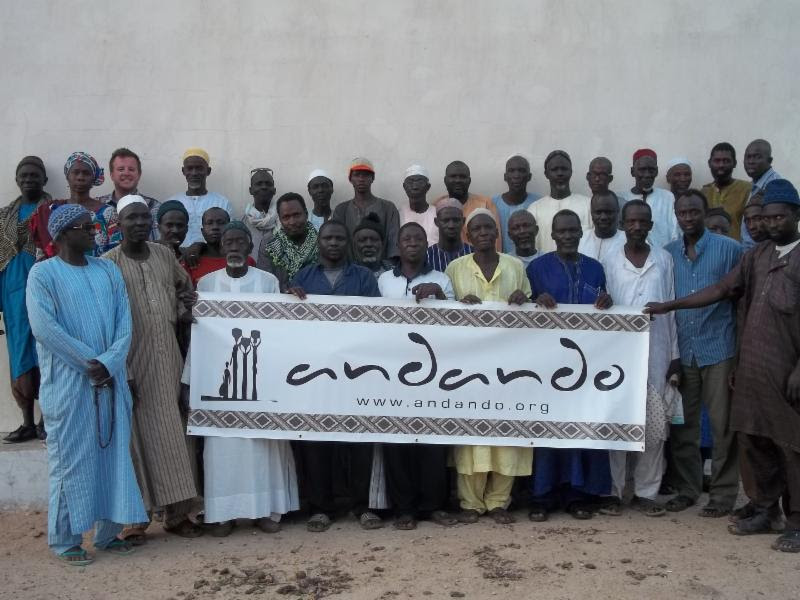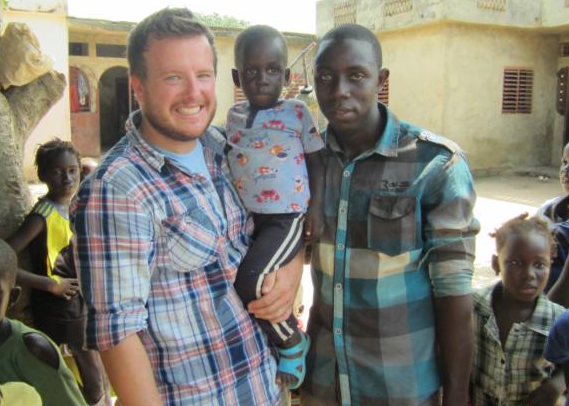The recently completed solar pump installations at the two market gardens in Keur Soce was cause for great celebration.
On our last visit, the ladies organized a great party complete with locally produced juice, delicious homemade snacks, drummers, story tellers, and many, many speeches from local and regional representatives.
Thanks to our partnership with Vibrant Village, the 150+ women who work in these gardens can now grow three seasons of crops instead of one. This means improved health and income for them and their families, directly impacting around 1,000 individuals, and many more indirectly through their market sales.
Madame Diagne is in charge of one of the market gardens and is head of the women’s cooperative made up of 85 ladies.
Now that the water is pumping, there is ample water to irrigate the one hectare plot she is the lead on. She has convinced the ladies that instead of expanding immediately, they will go through a one year cycle to determine whether or not to expand.
“We have organized ourselves into groups of about 10, with one woman responsible for a bed,” she tells us. They determine collectively what to plant. If they use for own use, they must ‘buy’ it from their group at a reduced price with everything going into a collective pot. Madame Diagne has taught them to be extra frugal at this point as there is no guaranteed income. However, they already have one steady customer in town, a small basic motel for 30 kilos of produce a week! Diagne says, “We are excited to have customers and now want to develop relationships with more and keep it steady.”
They will have three harvests per year instead of one and they hope this can translate into the ability to constantly be supplying customers. For the rainy season they are planning lower maintenance crops such as bissap, okra as they will be busy in the millet and peanut fields providing for their families. During the other two harvests they will plant higher cash crops to make money.
Diagne says, “We have already learned things like storing some water overnight in barrels because if we come early to the garden, there is sometimes not enough water as the sun has not been up long enough to fill the tank.” Overall there is always a surplus of water. They allow women to take water for home use but only in the late morning after watering, because then the sun has enough time to replenish the tank for the evening watering.
By working closely with the Garden Manager, Mandou Ba (picutred above), the women are starting to bring their own soil amendments, manure, peanut shells, etc. Some of these practices will take time as change does not come easy and the Senegalese (like anyone else!) are skeptical of new agricultural practices at first. Some of the crops being grown include, lettuce, carrots, onions, tomatoes, okra, corn, peppers, eggplant, radish, yams, potatoes, and cabbage. Diagne tells us that she already has plans to collectively purchase a scale to weigh their produce before it’s sold and keep better track of what is going in and out.
Overall, the garden has exploded with life and is a constant flurry of activity. We are confident that with strong leaders like Madame Diagne these market gardens will continue to grow and be a huge success.
We would also like to acknowledge the wonderful, professional, timely work done by FlexNRJ, a Dakar based solar company led by Pathe Diagne (no relation to Madame Diagne above). We are impressed by their work and professionalism and hope we can collaborate again in the future.











 Andando has worked hard over the last several years to establish thriving vegetable gardens in the arid peanut region of Senegal, in the community of Keur Soce. Working with local groups, we installed wells and solar-powered pumps to irrigate gardens run by women’s cooperatives. They have responded by working hard and dedicating themselves to the success of the garden and the hope it can give for a better future. Beyond the initial investment, our Garden Technicians work with these partners on a daily basis to provide technical assistance, special training workshops, and other support.
Andando has worked hard over the last several years to establish thriving vegetable gardens in the arid peanut region of Senegal, in the community of Keur Soce. Working with local groups, we installed wells and solar-powered pumps to irrigate gardens run by women’s cooperatives. They have responded by working hard and dedicating themselves to the success of the garden and the hope it can give for a better future. Beyond the initial investment, our Garden Technicians work with these partners on a daily basis to provide technical assistance, special training workshops, and other support.

 We recently conducted a small business workshop as part of our ongoing efforts to equip the villagers of Keur Soce with skills to help them thrive on their own. They have diligently worked over the past few years to build a successful garden in the midst of difficult conditions. They have worked to build up the soil, carefully monitored for pests, consistently watered everyday, attentively grown crops from seeds, and organized themselves into operating teams.
We recently conducted a small business workshop as part of our ongoing efforts to equip the villagers of Keur Soce with skills to help them thrive on their own. They have diligently worked over the past few years to build a successful garden in the midst of difficult conditions. They have worked to build up the soil, carefully monitored for pests, consistently watered everyday, attentively grown crops from seeds, and organized themselves into operating teams.













 One rural health post constructed for those with little access to healthcare
One rural health post constructed for those with little access to healthcare


















































